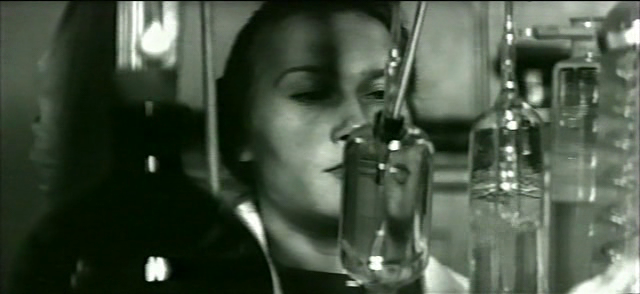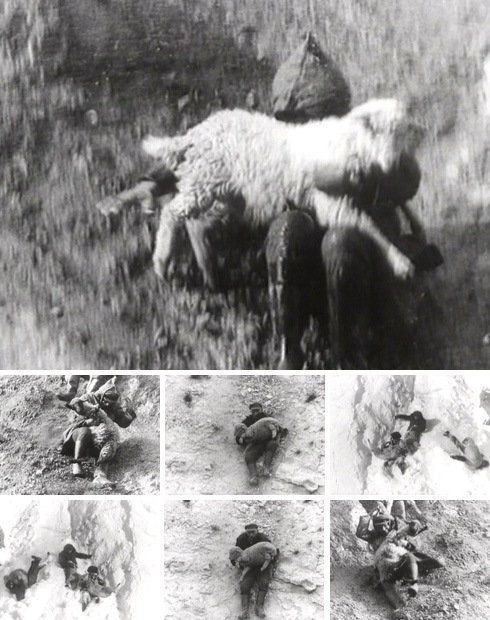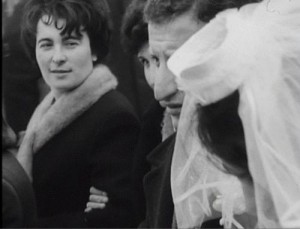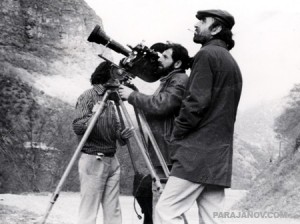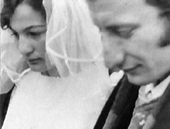Pelechian: Speechless in Armenia
For thirty years Artavazd Pelechian was buried behind the Iron Curtain, his work repressed by a government suspicious of its radical form and message. In the last decade the silence has been broken, and he has burst upon the global stage of the avant art world, now in his sixties, an old man with young eyes. He cut his teeth in Moscow’s fabled VGIK, which graduated Tarkovsky amongst others, then returned to Armenia and began to make found footage wonders that look like Eisenstein on speed, glowing black and white reflections on revolution, death and a vanishing country life.
Finally having a chance to see these long rumoured joys at Montreal’s Nouveau Fest I was thunderstruck—it was the best evening of movies I’d seen in years—breathless, mythic, exactingly rapturous and compassionately epic. The jewel of Armenia reminds us of what is possible in the cinema.
The morning after his screening I was upstairs, nursing one of those thick coffees that doubles as lunch, hunched over my Pelechian notes. When who should stroll by and take a seat at the table beside mine than the maestro himself. Accompanied by his wife, they sat blank and drinkless, letting it all wash over them. Like me, they understood no French, and so let the unfamiliar conjure the old question: language. Was it hardware or software? Or: if the unconscious is structured like language, are we different people because we speak differently? Do we fall in love differently? Become impatient, hostile, jealous differently?
Meanwhile, I am getting aesthetic blue balls sitting here. Without words, we have no medium to exchange, and it strikes me then that all his work is wordless, that he has anticipated this non-encounter, that everywhere he goes it’s just the same.
In entering the world of pictures, he has left language behind. His work is as speechless as I see him now, so I stifle the urge to crawl across the newly minted floor and throw myself at him in some desperanto gesture of praise, understanding that the solitary to which we are all condemned, the prison house we call personality, has been built one word at a time.
I’ve come to Montreal on a picture safari for the Images Fest. And as soon as I see the first flick from Pelechian, I know it has to open proceedings. It’s called In the Beginning. What’s a formalist to do? It was made thirty odd years ago, on the fiftieth anniversary of the October Revolution. In Pelechian’s hands: ten minutes that shook the world. The high octane montage rips the lid off old world orders as great assemblies mass and flee. Here are the crowd scenes of history, news clips from around the world jamming in frenzied cascades of new hope. Lenin urges them on, though after he’s laid to rest, Stalin succeeds him, and state police take aim at order. Meet the new boss.
He follows with another ten minute short made in 1970 called The Inhabitants. Pelechian’s version of The Jungle Book puts the wild back into wildlife. Here is nature red in tooth and claw, the hunt in its most primal form. Elephants, deer and rhino take charge, stampeding in views that must have left more than one camera operator short of a full load. Masterfully cut with exploding aerial views, this breathless animal kingdom is never far from death or dinner. Framed with achingly beautiful birds in flight, above it all, if only for a moment.
Beside me, maddeningly, a nodding hombre is carefully picking his way through confection camouflage designed by some perverse origami reject. There are wrapper scrolls strewn across the floor and he hasn’t actually hit the motherlode yet. While a lifetime’s work jets across the screen he is busy tearing and poking, and finally I ask him if he could stop and he looks at me, astonished. Because I’m English, you know, the oppressor in these parts, I worry he’s going to hit me, but he doesn’t. He covers me in curses that instantly obliterates my other self, the one that speaks only French, so in that parallel universe where only francais is visible, I am no longer even a memory.
Pelechian, meanwhile, ups the ante with his next offering. He’s pulverized us with found footage montage, now he’s going to mix in some of his own shooting, working that old Benjamin riff: Fascism aestheticizes politics while communism politicizes aesthetics. Somehow he takes on both sides in Us, a symphonic ode to life and death. Framed by a child’s look (orphan or God?), Us moves into an unstable landscape, showing natural catastrophes and then a mountain people grieving their own. Life on the land is rubbed up against city crowds—horses jostle with cars—before populations are hosed down by police, beaten with sticks, choked with exhaust. When the boy’s face returns, we know it’s not the beginning of something he looks out on, but its end. Us.
Like every good showman he saves the best for last. The Seasons (30 minutes 1972) is his meisterwork, the issue of a lifetime’s looking. Many of the images in this film are so fantastical, they appear as apparitions of found footage, part of some ghostly archive that only he can enter. Set in a mountain village in Armenia, he stirs together equal parts verité and myth making on a grand scale. This four sided eyeful watches sheep herders at work, struggling across rivers with their charge or passing them hand to hand on horseback. The Seasons also features a harvest like no other, vast bales tumbling down mountains while Chaplinesque farm boys race alongside.
When it’s over we leave, knowing we’ve had one of those rare moments in the cinema, allowed to enter the portal of another’s attention so very finely honed that nothing outside, not the scribbled graffiti which reads Hell is when no one believes, not the string of Depanneurs (okay, I admit it, I thought the Depanneur family was a French version of the Eatons), nothing looks quite the same anymore. And that’s just fine.
Originally published in: POV Magazine, Spring 2000
